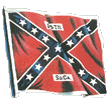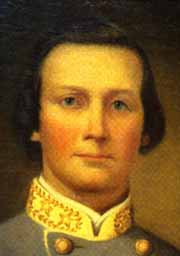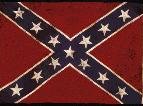South Carolina
C.S.A.

Lt. Rhind, U.S.N.
Report and Captured Documents

South Carolina
C.S.A.
|
South Carolina C.S.A.
|

|
Lt. Rhind, U.S.N. Report and Captured Documents
|

|
South Carolina C.S.A. |
|
|
|
Lt. Rhind, U.S.N. Report and Captured Documents The affair at Simmons' Bluff was the result of the aggresive action of Lt. A.C. Rhind, U.S.N. It appears that Lt. Rhind came to fight, at least for the time he was running the rivers south of Charleston. He appears from the offical records to have given good account of himself and by this date was nearing a promotion. Commanding the Crusader and the Planter and a detachment of the Fifty-fifth Pennsylvania Volunteers under Captain Bennett, he was able to move against Simmons' Bluff and the two companies of the Sixteenth stationed there with some authority. Lt. Rhind was not impressed with either Company A or Company H of the Sixteenth nor the Marion Light Artillery. This gives some weight to the issue of how aggresive the Marion Light was at Simmons Bluff. It would also appear that Captain Parker was concerned about the two companies of the Sixteenth before the raid and that concern would do nothing to make his report appear favorable for the Sixteenth. However, the captured documents from this raid make for some great reading. It seems the Sixteenth was into more during this time than wringing the necks of some Carolina chickens. Men do not change. The captured documents include two letters, both of interest. It appears that W.B, who is probably W.B. Dale (Assistant Surgeon) was also looking forward to some of the mentioned vegtables. The new rifles, the Einfields are also of some interest, primarily because of the lack of adequate weapons prior to that date. The second letter is from David Southern to Benjamin J. Southern. Private B.J. Southern will be killed in the Atlanta Campaign of 1864. If he ran at Simmons's Bluff he did not at Atlanta. Private Southern is buried with his comrades in Marietta Georgia. The battle in question is the action at Secessionville. Taking place on June 16 Johnson in The Defense of Charleston Harbor says the Confederate losses where around 200. It was in this battle that Ellison Capers of the Twenty-fourth South Carolina, later of the Gist Brigade first comes into the fore. |
|
U.S.S. Crusader North Edisto, June 23, 1862 Sir: I enclose a report of an expedition to Simmonís Bluff, on Wadmelaw Sound (River). I prepared the Planter for it by building some musket-proof bulwarks around her aft and about her machinery. We were piloted up by Robert Smalls, and were detained but once, by grounding near Bear Bluff, the Planter soon hauling us off. I enclose also two orders of the commandant of the guard at the bluff, dated the previous day, and extracts from two letters found there, one just written by the medical officer to his family and not dispatched, the other received by some person in the Sixteenth regiment from a brother on Sullivanís Island. I send you this letter, as it gives some account of the loss of the enemy in the first skirmishes at Stono. The Sixteenth South Carolina Volunteers made better use of their legs than the new guns alluded to by the medical officer. The few taken were Enfields, and with the cartridge boxes, seemed to have been just served out. I have engaged contrabands to cut wood for the Planter and pay them $2 per cord for it. She came here with little provisions and has been supplied from this vessel, reducing out own stock now to little over two weeks. Should nothing occur here to render her dentention absolutely necessary I propose to send her to Port Royal the last of this week for porvisions. Very respectfully, your obedient servant, A.C. Rhind Lieutenant, Commanding Flag-Officer S.F. Du Pont Commanding South Atlantic Blockading Squadron |
|
North Edisto, South Carolina June 23, 1862 Sir: On the 21st I took this vessel, followed by the Planter, Actin Master Phoenix, up to Simmonsí Bluff, on Wadmelaw Sound (River), and after a short engagement drove off the force of the enemy stationed there and captured and destroyed their camp. On board the Planter were 4 officers and 70 men of the Fifty-fifth Pennsylvania Volunteers, under command of Captain Bennett. From orders and papers found in the camp it appears that the force at the point consisted of the Marion Artillery and two companies of the Sixteenth Regiment South Carolina Volunteers, and that the regiment was placed two miles back. As we approached the point the artillery (which seemed to be quartered in some plantation houses near a mile off) was seen advancing and some baggage wagons going off from the bluff. We advanced slowly, without firing, my object being to draw the artillery down, but they seemed to halt in a clump of woods some distance from the point, and apparently retired, as we saw no more of them during the day. We passed slowly by the bluff at half pistol-shot distance, and received a smart musketry fire from rifle pits and houses. Our nearness seemed to have disconcerted their aim, as their volleys passed harmlessly over out heads. A couple of broadsides were discharged at them and when the smoke cleared away the enemy had disappeared. Rounding to, above the bluff , we passed slowly down again and anchored abreast the rifle pits and houses. I then went on board the Planter and taking her in to the shore landed with Captain Bennettís command, fired their tents, about thirty in number, and some cabins used as quarters. The enemy had taken off the baggage, etc., before we landed. A few muskets and other articles were brought away. We returned to our anchorage off the whark about 6 p.m. without loss and with very trifling damage. Colonel White, of the Fifty-fifth Pennsylvania, commanding the post here, and his officers and men cooperated with us with great cordiality. Very Respectfully, your obedient servant, A.C. Rhind, Lieutenant, Commanding Flag-Officer S.F. Du Pont Commanding South Atlantic Blockading Squadron |
|
Simmonsí Bluff, June 20, 1862 Gentlemen: I am sorry to have to call your attention to the fact that since the arrival of your respective commands great destruction has been committed on the vegetables (unripe) left in my charge by the proprietors of the island. I have been endeavoring to save for the general good all green food for man and horse, and I was astonished and provoked to find the melon vines stripped and the fruit wantonly destroyed; potatoes dug up by the row and wasting. No one but the commissary of my company has the right to pluck a single thing. I will order him to send to yourselves one-half of the produce, and if any soldiers are caught (either of my or your commands) trespassing, they will be promptly reported and punished. I beg that you will instruct your lines in such a way as to prevent the necessity of my again noticing the matter. My commissary will see you this afternoon and arrange with you as to the best manner of supplying yourselves. The men of your command are entitled to draw from the headquarters of the brigade. I am respectfully, your obedient servant, Edward Parker Captain, Marion Artillery, Commanding Post. Captains Mcjunkin and Barnett |
|
Simmonsí Bluff, June 30, 1862 All persons are strictly prohibited from taking any vegetables, such as corn, squashes, tomatoes, melons, potatoes, etc., from either plantation on this island. Melons not half ripe have been wantonly destroyed by those who had no regard for the rights of others or their own future comfort. The crops on this island have been left under the charge and for the use of the Marion Artillery. While the commander of the post is willing to divide with his brother soldiers any vegetables or fruit, he is not willing to see all deprived of a comfort by the unlicensed depredations of a few. Anyone, therefore, going into the vegetable gardens without special permission will be punished, and if depredations continue a guard will be posted night and day to protect them. Edward L. Parker Captain, Marion Artillery, Commanding Post Simmonsí Bluff, June 20, 1862 |
|
We have moved off from the regiment about 2 miles to Simmonsí Bluff. We are camped in a very nice place supposed to be very healthy, as it is the summer resort of a good many planters.
We will soon have a plenty of green corn, tomatoes, potatoes, and okra in abundance; that is, if the Yankees do not drive us away from here. We are in a ticklish place now; the Yanks can shell us at any time; we are anxious for the fray, so we can try our new guns. We got some new guns, called the Einfield musket. We want a Yankee boat to come along. We will give her a warm reception. I am acting as doctor for our two companies, etc. W.B. Sullivanís Island, June 12, 1862 They are fighting at Stono and James Island every two or three days, or rather skirmishing. I can see the smoke and hear the guns. I suppose that our side lost 65 killed, wounded and missing last Sunday, and last night the new came over that in yesterdayís fight our men lost 50 killed and 100 wounded, but to-dayís paper has not come yet, so I can not give you a correct account of yesterdayís fight. I do not know how soon we may have to leave this place, or where we may have to go, etc. David Southern Benj. J. Southern Care Captain Barnett, 16th Regiment, S.C.V. Adamsí Run |

|
|
|

|